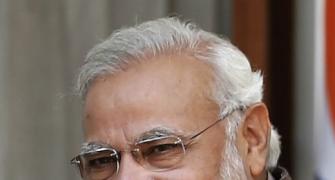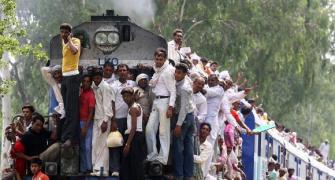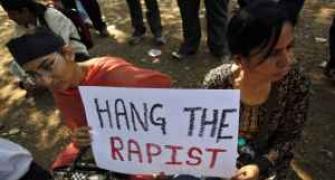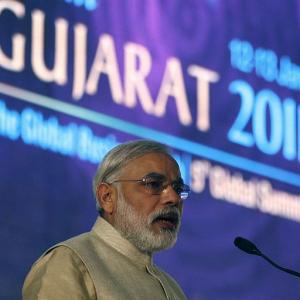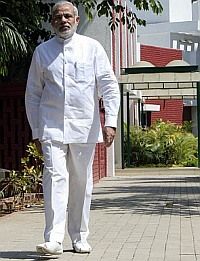 ‘His experience in the state of Gujarat, which is supposed to be a very successful model, has shown that he can make things move. He can be a person who can bring about reform, improve governance and so on.’
‘His experience in the state of Gujarat, which is supposed to be a very successful model, has shown that he can make things move. He can be a person who can bring about reform, improve governance and so on.’
‘The thing is, a whole lot of things that the people are thinking as new in the new government are not new, it is the revival of the old.’
‘See how China is growing, how south-east Asian countries are going. We cannot afford to be relaxed and be dictated by procedure and rules. So what people expect from Modi is that he should have the capacity to infuse a new dynamism in the democracy of the country.’
Former cabinet secretary Naresh Chandra speaks to Sheela Bhatt/Rediff.com.
The first of a two-part interview.
Much like election 2014, the rule by the Narendra Modi sarkar is making news. It’s not government as usual. Things are set to change in New Delhi. The style, approach and thinking of the rulers are also trend-setting. More than the electoral verdict, it’s governance by Modi sarkar that would bring in the bigger change.
Naresh Chandra, below, left, former cabinet secretary, diplomat and well-known strategic thinker, tries to explain what the Modi government is up to and assesses what will work and what may not work and why. He spoke to Sheela Bhatt/Rediff.com on diplomatic issues as well.
How do you see this change of government in Delhi? What is your first reaction to the first month of the new government in Delhi?
I think there are very many unique features in this change. For instance, we have as leader of the government someone who can be called in a conventional way an outsider. But this is not the first time. When Deve Gowda came, he was not from Delhi but he was a chief minister also. He made it to New Delhi but he made it as a candidate who emerged out of a coalition.
But in this case an outsider has come as an outright leader and someone who can be given credit for getting his party success and a majority after 30 years. So that is a very unique thing.
Second is his grounding has been as a grassroots-level organiser. And his experience in the state of Gujarat, which is supposed to be a very successful model, has shown that he can make things move. He can be a person who can bring about reform, improve governance and so on.
The other fact is that he is at the helm of government, I have discussed it with many civil servants, they feel that it is in everybody’s interest in improving governance of the country. So as elections are over now, everybody has to put their shoulders to the wheel. The country is facing a lot of challenges but there are opportunities available.
So this is the time for some very coordinated, cooperative action by all stake-holders to see that we improve our growth rate and governance.
How did you find the last one month?
What comes out is what I call very ‘newsy’ and presented to the public to stimulate interest. Basically what is happening in the last five years or so, the coordinating power of the prime minister's office and the cabinet secretary’s office -- these are the two prime nodal points -- there are others also like the finance ministry that force coordinated action or solve the conflict of interest between ministries.
But the thing is, a whole lot of things that the people are thinking as new in the new government are not new, it is the revival of the old. Like somebody said that the Group of Ministers has gone, number of cabinet committees has been reduced. Yes, that is the old pattern. When I was cabinet secretary, there was no GoM, there was a cabinet committee and committee of secretaries.
In Jawaharlal Nehru’s time there were very few cabinet committees. Even P V Narasimha Rao didn’t have many cabinet committees, nor did Indira Gandhi. So what Modi is doing is emphasising the traditional system, bringing it back on the rails.
It’s not that the PMO is powerful or the cabinet secretary is powerful but the point is the decision-making and project clearances have to be fast. See, in these days we can’t afford to waste a lot of time. When we were satisfied with a growth of two-three percent and resources available were short, the budget was not very respectable in terms of size, people could be a bit easy-going. But now the rate of change and the rapid change in technology means you have to move fast.
See how China is growing, how south-east Asian countries are going. We cannot afford to be relaxed, and be dictated by procedure and rules. So what people expect from Modi is that he should have the capacity to infuse a new dynamism in the democracy of the country and I’m afraid, some officers are a bit apprehensive but the majority are very glad.
 Why apprehensive?
Why apprehensive?
Some Indian Administrative Services officers are apprehensive that, you know what happens when the accountability thing comes in play, you get pushed. They have problems of trust. They have seen some of their colleagues come to grief for having taken some decisions. You know files keep going up and down when you’re deciding important matters.
You don’t know five years later somebody somewhere, abroad or in some other place, just because a particular transaction gets referred to the Central Bureau of Investigation and the CBI starts interrogating even those who typed the file, 'oh you typed the file so you helped the company in question'. So the point is you have nothing to do with the corruption case, you have taken no money, you have no guilty intention but the Prevention of Corruption Act is so framed that you can be put in trouble.
If the inspector or the assistant director of CBI decides that benefit has been caused to some private party without any public interest, then you are guilty of criminal misconduct and you can be put in Tihar Jail for seven years -- even though you may have retired 10 years ago.
This doesn’t exist in any other country of the world. India is a common law country. This in my view is an action of disgrace in our sense of fair play and Indian jurisprudence and I’m surprised why the courts that are cracked up to be great protector of individual freedom and so on have not focused on this issue. We have pointed it out, the previous government accepted it. What the civil service expects now is going to be a test for the new Modi government.
But very few countries have this level of corruption so you’ll have to keep a check on corruption, too.
You can’t murder civil liberties. Nowhere in the world is a person held to be a criminal without any guilty intention. I am sure these judges have given repeated rulings they have not tested so far. They are not abiding by their own rulings that there has to be mens rea meaning guilty intention. If the guilty intention is not there ,the criminal offence cannot take place. It is the central principle of law and it has been diluted by this section of the PCA that applies to government officers.
Coming back to Modi…
Now it is Modi’s job to fix this and if he doesn’t fix it, the senior civil servants are not going to trust his government that you can take bold decision without any fear. When the CBI gets into action, the PM and courts are powerless to protect them. He must accept he is powerless. This powerlessness has been compounded by the fact that the Supreme Court has thrown out the protection available to senior officers that you can’t be prosecuted without the government’s sanction. So now it’s a free for all.
It is my settled opinion, and I’m saying this with some sense of responsibility, that if these two sections -- the definition of criminal misconduct and second is the taking away of this protection for senior civil servants even secretaries to the government -- are not fixed, civil servants will not act as Modi wants them to.
The Supreme Court has said this protection is okay for high court judges but is not okay for cabinet secretaries, secretaries to government and service chiefs. (Section 6A of the Delhi Special Police Establishment Act that protected civil servants from prosecution has been quashed by the Supreme Court recently. Now the CBI doesn’t need the permission of the government to prosecute civil servants for their alleged involvement in corruption).
What’s the message from the PM’s meeting with top secretaries?
The message was very positive. Some of the key secretaries I interacted with at the social level. They were all very impressed and happy. It had sent out a good and very powerful message.
But words only go that far... This message has been given by PM Manmohan Singh, earlier also. Act boldly, act with courage, but I’m telling you, the way the law is today, the increasing power that has been given to the CBI, things may not work well. And the views expressed in court and in Comptroller and Auditor General reports and the media, please take it from me, civil servants will not act with boldness.
Modi wants that the bureaucracy should run governance which will lead to development. His critics allege that Modi’s emphasis is not on a participatory model of development where MPs, MLAs to sarpanches become instruments of change.
You see, governance is associated with the bureaucracy but I think it’s a larger term and there are other stake-holders. You have officers whose role is not much of great governance. There are record keepers, writing a gazetteer, deciding petty cases is not great governance.
On the other hand you can be a social worker or running a great eye hospital. That’s a part of governance. Only thing that the public wants is actions that benefit the public. It can be done by a bureaucrat, professor, social activist running a hospital or an orphanage, it can be a private company.
You know we had a situation where there was a lot of corruption in the allotment of steel and this corruption was taking place at the stockyards of private steel companies. The person who was allotting steel rails or girders to parties, he was a part of governance. He was doing something a steel controller would do and the same applies to cement controllers and cement companies.
So governance can fall in the lap of anybody whether he is a bureaucrat or not. What Modi is trying to do is that the government servants should do their job. What has been happening lately is that the working has been disturbed. There is no harm in an MLA working or lending their shoulder to the wheel in expediting a programme of bringing the public grievances to the notice of bureaucrats or ministers. It is their job, they must do it.
But if they start interfering with the decision-making and do preferential allotment of contracts and interfering with purchase orders, as it is the allegation in many places, I don’t think it’s good.
And I think what the new government and PM are trying to do is to keep this negative interference of elected representative or party workers away from the decision-making process which has to be fair.
When we were trainees, we were taught that your most important job is to be fair. If a government servant is not fair then you lose credibility and the public is disheartened. The biggest problem is that people in general in India is that the police station does not act in a fair manner.
That if you go to the tehsil to register your documents or go to the municipal corporation, you will not get a fair deal. You will be treated as a profit centre and as someone who can be harassed at will by the bureaucrat. This generates disaffection towards the government.
Modi wants to clean the office. This is the beginning. It should not be that you go to get some documents, you pay Rs 50 lakh of stamp duty but you were made to stand in the sun, your number won’t come unless you get hold of some tout who passes money… you go to any registrar’s office in Delhi and you will know what is going on.
What Modi is trying to say is that bureaucrats should do their job and they are responsible for their action and this alibi that they are acting under political pressure is not going to work.
At the same time he is sending a message to political party workers and MLAs and MPs that please don’t bring undue influence. MPs and MLAs must influence the government, nobody can deny it, they hold the mandate to form the government. But it’s not they should have influence or not. They should have influence and it should be properly applied. MLAs and MPs must make sure that they are not forcing a government officer to exercise power in an unfair manner.
Do you think that Narendra Modi as PM would be a game-changer or a trend-setting PM?
I think this question can be answered with a very short answer, and that is yes.
To be concluded.

